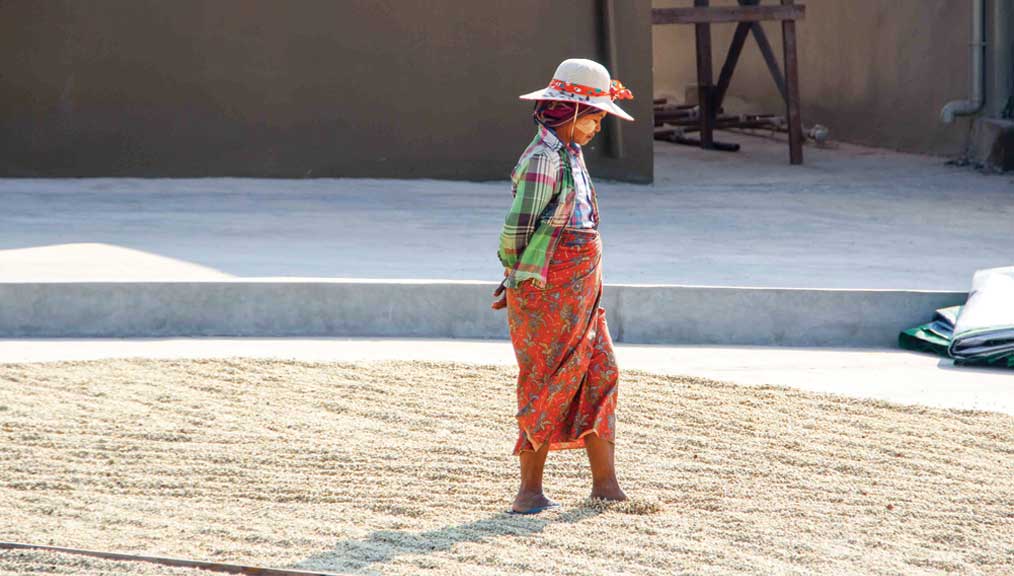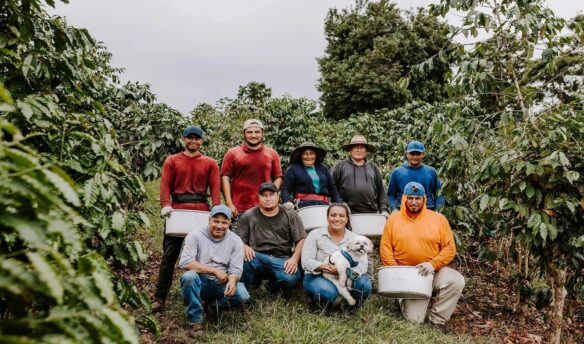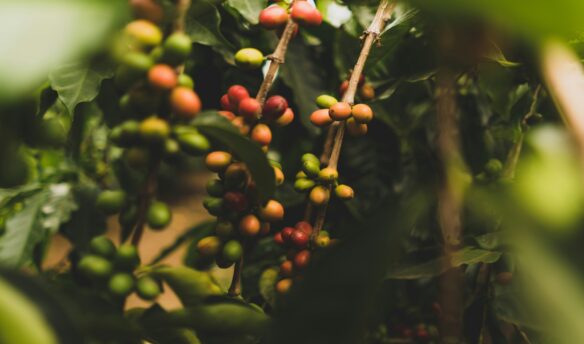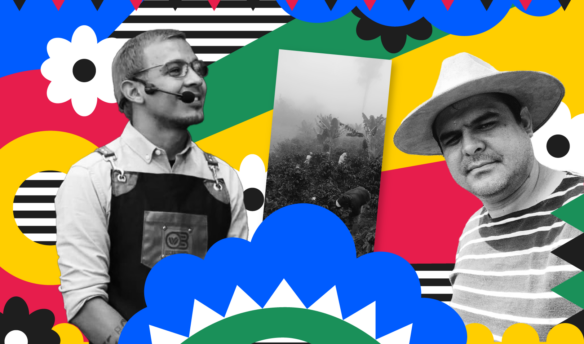[W]ithin the specialty coffee industry, the emergence of Myanmar as a coffee origin is currently a popular subject, and rightfully so. The situation is unique: after generations of relative isolation, the country is reconnecting with the rest of the world. Coffee, as it has done many times throughout history, is once again creating opportunities for those connections, and providing one lens through which the world can get to know this complicated nation in a time of transition.
Much of what the rest of the world knows of the Myanmar coffee industry relates to work funded by the United States Agency for International Development (USAID). As part of a five-year rural development project focused on improving agricultural value chains in Myanmar, USAID awarded funds to the implementing non-profit organization, Winrock International, which has partnered with the Coffee Quality Institute (CQI) to support Myanmar’s coffee professionals as they make a name for themselves in the global specialty coffee scene.
From agronomy workshops with smallholder farmers, to barista trainings in growing cities, to national strategizing meetings with industry leaders, this initiative aims to encourage inclusive growth and has brought international attention to the coffees of Myanmar.
While the financial support, know-how, and access to markets provided by these organizations is vital, they support an industry that has long existed in Myanmar. Here is an introduction to some of the local people who make up the coffee industry in Myanmar, and their thoughts on what role specialty coffee might have in their future.
These interviews have been edited for clarity and space.
Mya Mya Aye and Myo Thet Htun
Mya Mya Aye and Myo Thet Htun are key employees of the Mandalay Coffee Group (MCG), the largest coffee mill and specialty coffee–focused exporter in Myanmar. Mya Mya Aye handles many administrative duties, works with the warehouse supervisor to make sure every MCG lot is properly sampled, and green grades, roasts, and cups on a daily basis. Myo Thet Htun, better known by his nickname Moe Set, oversees the pulping, drying, and dry milling of the coffee. Together they manage nearly fifty workers during harvest season, and they have been with MCG since the processing plant opened in mid-2015.

Mya Mya Aye and Moe Set are from Meiktila and Myingyan respectively, both in Myanmar’s central dry zone. They met while working for the same company in June of 2013, and married in November of 2014. The couple lives on the MCG premises, and much of the specialty coffee produced in Myanmar passes under their eyes, be it on a spreadsheet and in the cup with Mya Mya Aye, or in the process of transforming the cherries into the highest possible quality green coffee beans with Moe Set. This year MCG took first prize in the “dry naturals” category of the annual Myanmar Coffee Association (MCA) competition for cup quality, with international judges giving a record-breaking score of 89.58 points.
How did you start to work with MCG?
MS: My wife’s sister works at the small factory of a local coffee roaster here in Pyin Oo Lwin, and when the MCG board of directors was looking for people to operate this new processing center, she recommended us through that roaster. Before we joined MCG, I was teaching math, physics, and chemistry to students in grade eight to ten, and Mya Mya Aye was an accountant. We didn’t have any coffee knowledge at first, but we have learned a lot from MCG’s directors, and the experts we’ve met through CQI. Now we believe that coffee is really interesting and we are working hard to make a good product.

What are the advantages and disadvantages of working in coffee as compared to other jobs available? Why is specialty coffee unique or interesting to you?
MMA: One disadvantage to our work is that during harvest season we have very little or no holiday, and if one of us is resting the other needs to be available to supervise the workers. But as MCG is becoming more established and systematic in the way we do things, it is more possible for us to set things in motion and take a couple days for visiting family together without worrying too much.
MS: Specialty coffee is so great in quality that everyone is pleased when they drink it or learn about the background story of the dedicated work involved in producing it. If the mill is not too busy I sometimes take a moment to participate in cuppings, and I’m learning how green [unripe] cherries feel dry in the cup, or how inconsistent drying on the patio can lead to a moldy flavor. This motivates me to make sure our processing work is careful because I don’t want anyone to taste Myanmar coffee and have a bad flavor.
Sai Wan Maing
Sai Wan Maing is the owner of Green Land Estate, one of the largest and most respected coffee farms in Myanmar. Sai Wan started Green Land in 1999, planting thirty acres of coffee outside of Pyin Oo Lwin. Four years later, he was named Outstanding Coffee Grower by the Food and Agriculture Organization of the United Nations (FAO). Over the years, coffee production has expanded at Green Land, and today over 430 acres are under production. Last year, one of Green Land’s coffees won the second annual MCA competition for cup quality, and Sai Wan also became one of the first Q arabica graders in Myanmar.
How did you become interested in coffee?
Many people in Myanmar prefer tea or three-in-one instant coffee, but I grew up with pure coffee—I always enjoyed drinking coffee. When I was young, my family would travel from Yangon to visit relatives in Northern Shan, and I remember enjoying the peaceful nature of the coffee farms we passed along the way. When the government started leasing land around Pyin Oo Lwin at low rates, we decided to expand from other businesses and try coffee. Everything has grown since then.
Myanmar is undergoing a period of substantial political change. How has this change impacted coffee growing? Even as recently as four to five years ago, there was not much demand for coffee, and very little differentiation for higher quality coffee. The fact is that there were just not that many buyers—mostly local buyers, as well as some from China and Thailand. Together with the support of USAID, Winrock International, the CQI, and local partners like Sithar Coffee, we are bringing coffee education to the local market here in Myanmar, and access to foreign markets in the United States, Switzerland, France, Japan, Korea, Taiwan, Australia, and others.

What are some of the challenges ahead, both for Green Land and for the emerging specialty coffee industry in Myanmar?
Low yields are one of the biggest challenges both for Green Land and for other smaller estate farms in Myanmar. Most of the small farms in Myanmar produce very low yields, which makes it difficult for them to cover the cost of production. Another challenge for Myanmar will be the growth of the specialty coffee industry in neighboring China.
Ko Ko Win
Ko Ko Win is an agronomist and a senior program officer with Winrock International, working with smallholder growers to improve both coffee yields and quality. He graduated from Yezin Agricultural University in 2003 with a bachelor’s degree in agricultural science, and after graduation began working for the Ministry of Agriculture as an agronomist. In 2004 he was selected to study in Israel, focusing on high technology fresh vegetable production using greenhouses and fertigation. In 2010 Win was awarded a scholarship by the Korea International Cooperation Agency (KOICA) to pursue a master’s degree in agriculture and rural development in South Korea.
How did you get involved in coffee?
Although Myanmar might seem like a “new origin” to foreign coffee markets, we have been growing coffee here for many years, since the British colonial period. I personally started working in coffee when I returned from Israel in 2005. I worked with coffee growers in the agriculture extension office for five years, between my studies in Israel and South Korea. When I returned from Korea, I worked for the coffee research department of the Ministry of Agriculture. In 2013 I left the ministry to work with the United Nations Office on Drugs and Crimes (UNODC) on their Alternative Development/Sustainable Livelihood project in Myanmar. The goal of that project was to replace opium production with coffee production. In 2015, I began my work with Winrock International.

As an agronomist with experience in specialty coffee production, what areas of Myanmar do you think have potential for producing high quality specialty coffees?
Coffee production areas that are currently moving towards specialty level include Ywar Ngan and Pin Laung (Southern Shan), Pyin Oo Lwin and Mogok (Mandalay Division), and parts of Chin State. There are also lots of areas with potential that have not been explored very much yet, such as Kyaing Tong (Eastern Shan), Kyauk Ta Lone Gyi (Southern Shan), and De Maw So (Kayah State). This is not a comprehensive list since specialty coffee production is new to Myanmar and there are so many areas to explore.
Su Nandar Linn
Su Nandar Linn’s family owns Shwe Ywar Ngan Coffee, a farm, processor, and roaster in Ywar Ngan, Shan State. Her father, Win Aung Kyaw, has been in the coffee business since 1975, and has played an important role in disseminating both improved coffee cultivars and new coffee production technologies. The oldest of four children, Su Nandar Linn has embraced the new specialty coffee movement in Myanmar. One of Shwe Ywar Ngan’s washed coffees placed fourth in this year’s annual MCA competition for cup quality, scoring 85.33 points. Su Nandar Linn is determined to keep improving over time.
How did your family get into the coffee business? What all does Shwe Ywar Ngan do?
My father started roasting coffee when he was only seventeen, and from there the business grew over the years to incorporate coffee at many levels, from growing to processing to exporting. My family moved to Ywar Ngan township in 1998 to grow and process coffee here, and some of my earliest memories are of playing on the drying patios when I was around four years old. My family has always preferred coffee over tea. In addition to growing, we process coffee using washed, natural, and honeyed methods. We produce green coffee beans but also roast and package for the national market.

Myanmar coffee has recently gained increased international attention. How are these new connections influencing you?
It’s been great since Winrock and the CQI have come to Ywar Ngan and helped us with processing and producing. We have learned so many things from Marcelo about producing and processing specialty coffee [Marcelo Pereira, a former CQI consultant who was subsequently hired by Winrock International as a smallholder specialist to lead their coffee team]. I have attended many of the workshops that he has put on, about farm maintenance, pruning, and using bokashi [a method of composting]. I also learned how to roast better with Scott [Scott Conary, owner of Carrboro Coffee Roasters and a consultant with the CQI], how to do different processing with Mario [Mario Fernandez, technical director of the CQI], and I did the Q Arabica Training Course with Luz Stella Artajo-Medina [a CQI instructor].
These workshops have been valuable for me, giving me the opportunity to learn new methods which I didn’t know in the past. There’s been quite a change in the quality of the coffee after the interactions with CQI and Winrock International. These workshops and courses have influenced me in such a way that now I feel like I’m tasting and processing like a professional, and that I now have the skills to produce and process better and better every year, taking Myanmar coffee to a new level.
What are your plans for your career?
My plan is to become a specialist in terms of quality. I recently finished university in Mandalay, and I have no plans to work in any other field other than coffee. It has been a long road, with years of hard work and learning from our mistakes. I think I can learn from this and take the legacy of Shwe Ywar Ngan coffee even further. I’m very much fond of coffee, and this is where I want to be.
—Joel Shuler is the owner of Austin, Texas-based Casa Brasil Coffees and Little City Coffee Roasters. Amy Vannocker is the general manager at Mandalay Coffee Group.




















